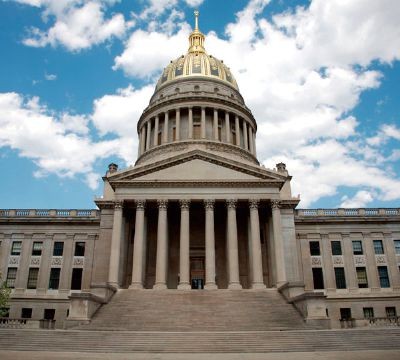CHARLESTON — The Republican majority in West Virginia’s Senate passed a broad-ranging education bill after two and a half hours of emotional debate Monday.
The bill next goes to the House of Delegates, where it’s unclear how it might be received.
“Many of the bills we see come through are code changes and relatively small items,” Senate President Mitch Carmichael said from the stairs that lead into the chamber.
“This is a bill that you are here today to witness that fundamentally changes the lives and the prospects and opportunities for teachers and students and parents in this state to take us from last place to first place.”
The vote on the bill, as it almost always was during earlier votes, was 18-16. Republican senators Kenny Mann and Bill Hamilton voted with the Senate’s 14 Democrats.
The bill includes a long-promised pay raise for educators.
It also opens the way for charter schools and educational savings accounts that would set aside public dollars for private schooling for a certain number of participants.
The bill would also let teachers bank personal days for retirement credit. It would give counties greater latitude in paying some teachers more for in-demand expertise.
The bill would require teachers to sign off annually on union dues. It stipulates if there’s a work stoppage that closes schools, those involved would not be paid.
It’s all tied together with a non-severability clause, saying if any part of the bill is struck down, it would all be void.
House Speaker Roger Hanshaw issued a measured statement last week about the Senate bill.
“We too have been following developments in the state Senate, and will deliberately review any legislation they send our way,” stated Hanshaw, R-Clay.
“Meanwhile, we continue to have discussions with our members and other interested parties about how best to improve our state’s education system. We have and will continue to accept input from all sides — including teachers, parents, administrators and teacher and service employee unions.”
Gov. Jim Justice continued to press for the pay raise bill to run on its own. Justice indicated he would veto the bill as it stands.
The governor repeated those sentiments during a press conference about state revenue on Monday. But he cautioned to let the process play out and to avoid assuming ill-intent.
“It’s difficult for me to understand,” he said. “But I am very respectful for the fact that the Senate Republicans believe we should make improvements in education, and they think that’s what they’re trying to move toward. I am one that believes, as I think the education community believes, that there’s no question we can do better.”
Justice continued, “The net of the whole thing is, I think it will be OK. At the end of the day this has got to go to the House.”
Other groups chimed in about the bill’s passage in the Senate.
The state Republican Party praised the Senate, rather than take the side of the governor, who is the Republican leader of the executive branch.
“I applaud and thank the West Virginia State Senate for their boldness and leadership in advancing this much-needed comprehensive education reform bill,” stated Republican Party chairwoman Melody Potter. “I encourage members of the West Virginia House of Delegates to consider these bold reforms.”
The state Democratic Party was critical of the bill, saying teachers, principals and school boards were not consulted.
“I am proud and thankful for our Senate Democrats who fought tooth-and-nail for our students and public education,” stated Democratic Party chairwoman Belinda Biafore. “The bill is headed to the House, where I can assure you it is up for a fight.”
For more than two hours Monday, senators spoke for and against the bill.
Sen. John Unger, D-Berkeley, said the bill was bundled as a way to complicate the pay raise promised last October.
“They yoked it, they chained it, they held hostage the teachers and service personnel’s raises,” Unger said.
Senate Minority Leader Roman Prezioso, D-Marion, read from editorials in Morgantown’s The Dominion Post and Fairmont’s Times West Virginian. He said the staff opinion pieces demonstrate a lack of public support for many of the contents of the bill.
“Ladies and gentlemen, I would hope we would rethink what we’re about to do today,” Prezioso said. “If newspapers are printing this now, just think of what’s going to happen during election time.”
Senate Education Chairwoman Patricia Rucker, R-Jefferson, suggested elements of the bill would give parents greater choice. Rucker has received criticism for leading the education committee even though she homeschooled her own children.
“A lot of folks have tried to make this legislation about me. That could not be further from the truth. I do not gain anything from this legislation. But I care,” Rucker said.
“This legislation, I believe, may be the most important thing we’ve ever done, and definitely the most important thing I’ve ever been a part of.”





